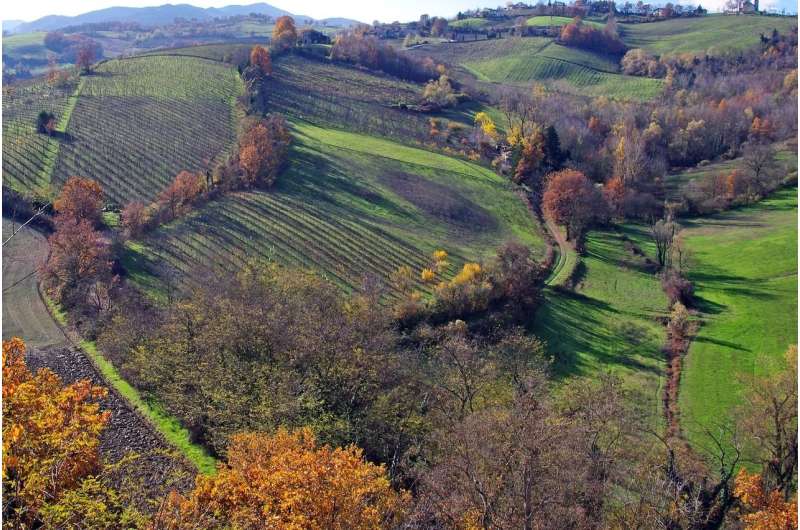Ancient farming techniques could help mitigate climate change

High technology is being deployed to uncover long-forgotten irrigation systems and other features concealed in landscapes that farmers developed hundreds of years ago to nurture their land.
By studying landscapes of the past and how they're used today, scientists can draw on Europe's cultural heritage to help tackle challenges such as climate change and rural exodus.
Professor José María Martín Civantos, of the department of medieval history at the University of Grenada, Spain, sees lessons for today in the cultural history of mountainous Mediterranean landscapes in Spain, Italy and Albania, which he and his collaborators studied in a project called MEMOLA.
Centuries ago, farmers and rural communities in southern Europe adapted to become experts in water, soils, crops and animal management to keep their lands fertile and productive. These practices helped rural communities withstand periodic stresses such as drought and food scarcity.
'In the race for modernisation, intensification of production and competitiveness, we have neglected, forgotten or even (discarded) all that knowledge, all that heritage, all that richness,' said Prof. Martín Civantos.
The researchers conducted surveys using a laser scanning technique called LIDAR and created 3-D maps of sophisticated irrigation systems dating back more than a thousand years. These were used for channelling water from areas of surplus to areas of demand.
The team combined the maps with a range of other techniques and disciplines, including ethnography, hydrology, archaeology, agronomy, botany, and soil science, to understand the co-evolution of the landscape with the people who live there.
They even worked with high school students who used the hugely popular video game Minecraft to create interactive 3-D worlds demonstrating culturally important irrigation systems.
Sowing water
Among the principles MEMOLA researchers identified was channelling water from mountain peaks to areas where it can be used to recharge depleted aquifers. 'Sowing' water in good times and 'harvesting' it when it is most needed, is a sophisticated technique for dealing with environmental stress.
'This is a most modern concept for the management of water in a river basin, but it is something that has been done in some communities for centuries,' said Prof. Martín Civantos.
Ideas such as these can contribute materially to policies which improve sustainability and aid in mitigating the effects of climate change.
He sees room for further research to revive interest in the cultural history of the Sierra Nevada mountain range in Spain as well as in northern Italy and Sicily. Some features that fell into disuse fairly recently could benefit from restoration while other, older features not only provide lessons, but can also contribute to contemporary life through culture, education or tourism.
'It is really worthwhile to preserve and promote (this cultural history), to ensure best practices in our relationship with the environment, but also in our social relationships, in the way that our natural resources and territories are managed,' he said.
It's not only climate change that can threaten Europe's landscapes—rural exodus and urbanisation can also challenge their preservation. But scientists are finding new ways of gathering information about the significant aspects of a particular landscape.
Researchers on the HERCULES project tapped in to social media and other tools to populate incomplete data sets, piecing together a more complete picture of how people in specific communities value particular landscapes – not only for ecological value, but also cultural value.
Using photo sharing platforms such as Flickr and the now defunct Panoramio, they were able to assess the density of contributions of photographs of a particular landscape, providing an indicator of the social value being attached to it.
'Among the new methods were online mapping tools, where local people were able to show us places and parts of the landscape that were important to them for particular reasons,' said Dr. Tobias Plieninger, now of the University of Göttingen and University of Kassel in Germany, but who coordinated the project while at the University of Copenhagen, Denmark.
The researchers were also able to use the number of traditional food products or geographically defined products as another indicator of the cultural and social value that people attach to particular regions.
'Something such as Parma ham can be an indicator of the cultural importance that an agricultural landscape can have,' Dr. Plieninger said. 'Combining these with farm-level and other indicators can be used to identify and characterise different types of cultural landscapes in Europe.'
Sustainable development
This is a crucial step in assessing how to preserve European landscapes of significant cultural, historical and archaeological value at local, national and pan-European scales. It can also contribute to policies in areas such as agriculture or biodiversity as part of an integrated landscape management approach, which can contribute to achieving the UN's sustainable development goals by taking into account the multiple uses of landscapes.
'Landscapes do matter – they host multiple societal values,' Dr. Plieninger said. 'And these cultural values have a broad set of meanings. Some of these are more tangible, such as a site being for recreational use. Others provide links to cultural heritage, or even nature conservation, agriculture or forestry.'
HERCULES put its findings into action through a knowledge hub for good landscape practice, capitalising on the crowdsourcing tools developed to provide a toolkit for landscape management. By combining the fruits of its multidisciplinary approach, this takes into account the natural environment, the human processes that co-produced it, and the human wellbeing that depends on it.
Provided by Horizon: The EU Research & Innovation Magazine



















